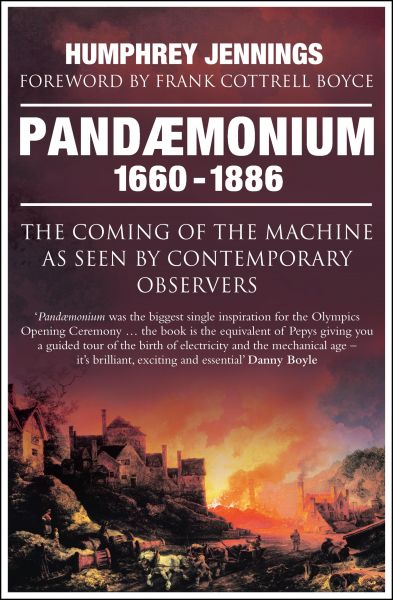Pandaemonium 1660–1886
The Coming of the Machine as Seen by Contemporary Observers
Collecting texts taken from letters, diaries, literature, scientific journals and reports, Pandæmonium gathers a beguiling narrative as it traces the development of the machine age in Britain.
Covering the years between 1660 and 1886, it offers a rich tapestry of human experience, from eyewitness reports of the Luddite Riots and the Peterloo Massacre to more intimate accounts of child labour, Utopian communities, the desecration of the natural world, ground-breaking scientific experiments, and the coming of the railways.
Humphrey Jennings, co-founder of the Mass Observation movement of the 1930s and acclaimed documentary film-maker, assembled an enthralling narrative of this key period in Britain's national consciousness. The result is a highly original artistic achievement in its own right.
Thanks to the efforts of his daughter, Marie-Louise Jennings, Pandæmonium was originally published in 1985, and in 2012 it was the inspiration behind Danny Boyle's electrifying Opening Ceremony for the London Olympic Games. Frank Cottrell Boyce, who wrote the scenario for the ceremony, contributes a revealing new foreword for this edition.
Humphrey Jennings was educated in Cambridge at school and at Pembroke College, where he read English. He joined the GPO Film Unit in 1934. In 1936 he, Tom Harrisson and Charles Madge founded Mass Observation, and in the same year he exhibited at the International Surrealist Exhibition. He is best known for the documentary films he made during the war. He died in 1950.
a composite picture of how contemporaries experienced the triumph of the machine, how it transformed both their outward circumstances and inner lives
'Pandaemonium' is far from routine
Jennings ... was pursuing a vision, an intuition which could never have been more complete than it is here
a monument to one of the unique artists of our time, a visionary poet
fluid and imaginative
Pandæmonium was the biggest single inspiration for the Olympics Opening Ceremony ... the book is the equivalent of Pepys giving you a guided tour of the birth of electricity and the mechanical age - it's brilliant, exciting and essential.
Stimulating to mind and imagination ... a monument to one of the unique artists of our time, a visionary poet ... you will be illuminated and enriched.
A continuous narrative on the Industrial Revolution, woven from contemporary observations and opinions ... a treasure-chest of quirky, unusual pieces
A masterpiece of collage that reads like a novel
What [Jennings] reflects so intelligently here is not merely England (and, by implication, Europe) getting uglier and viler by the decade, but also the spiritual inexorability of this process.
Pandaemonium is a fascinating and disturbing anthology ... the extracts are brilliantly chosen ... a very fine book
In short, this is nothing less than a one-volume history of modern Britain. It is extraordinary how Jennings managed to turn a concatenation of accounts ... into something that has such power.
With its fabulous montage of sources, this is a unique window into a national past, and a global present.
Jennings was an inspired maker of documentary films ... his book startles and delights
Pandaemonium is an extraordinary and wonderful book
gnomic, stimulating to mind and imagination
you will be illuminated and enriched
The first thing that strikes you is the high quality and enormous variety of the 'images' that he assembled. Much of his material comes from little-known sources, while familiar names tend to be represented by unfamiliar excerpts. But there is no straining after novelty for novelty's sake. Almost all the extracts have powerful points to make, and most of them are examples, at the very least, of good, vigorous English prose. Some of them are superb.
a book that sets ideas in motion
[The] choice of texts ... conveys the heroic promise of industrialism as well as the devastation, the humanistic spirit of science as well the dehumanizing dangers.
an epic scenario
the selected passages are delightful and arresting
a book which is at once a treasure-chest of quirky, unusual pieces and a memorable account of the most devastating and exciting sea-change which has yet engulfed mankind.
What is remarkable ... is that the collection is so fresh and invigorating.
[The] magnum opus of one of the most remarkable English talents of [the 20th] century.
an extraordinary narrative picture of the development of our industrial society
[Pandaemonium] is above all a collection of voices ... in a glorious cacophony .... [T]aken together they tell us more about a period of intense upheaval than many an orthodox anthology.
the strength of the book is the wide variety of texts used and the two excellent indexes. A good reference book and a useful source book for students of the machine age.
Versandkostenfreie Lieferung! (eBook-Download)
Als Sofort-Download verfügbar
- Artikel-Nr.: SW9781848315860110164
- Artikelnummer SW9781848315860110164
-
Autor
Humphrey Jennings
- Mit Marie-Louise Jennings, Frank Cottrell Boyce
- Wasserzeichen ja
- Verlag Icon Books
- Seitenzahl 416
- Veröffentlichung 04.10.2012
- Barrierefreiheit
- ISBN 9781848315860
- Mit Marie-Louise Jennings, Frank Cottrell Boyce

